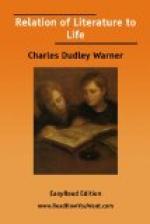It is not alone of the poetical nations of the East that this is true, nor is this desire for the higher enjoyment always wanting in the savage tribes of the West. When the Jesuit Fathers in 1768 landed upon the almost untouched and unexplored southern Pacific coast, they found in the San Gabriel Valley in Lower California that the Indians had games and feasts at which they decked themselves in flower garlands that reached to their feet, and that at these games there were song contests which sometimes lasted for three days. This contest of the poets was an old custom with them. And we remember how the ignorant Icelanders, who had never seen a written character, created the splendid Saga, and handed it down from father to son. We shall scarcely find in Europe a peasantry whose abject poverty is not in some measure alleviated by this power which literature gives them to live outside it. Through our sacred Scriptures, through the ancient storytellers, through the tradition which in literature made, as I said, the chief continuity in the stream of time, we all live a considerable, perhaps the better, portion of our lives in the Orient. But I am not sure that the Scotch peasant, the crofter in his Highland cabin, the operative in his squalid tenement-house, in the hopelessness of poverty, in the grime of a life made twice as hard as that of the Arab by an inimical climate, does not owe more to literature than the man of culture, whose material surroundings are heaven in the imagination of the poor. Think what his wretched life would be, in its naked deformity, without the popular ballads, without the romances of Scott, which have invested his land for him, as for us, with enduring charm; and especially without the songs of Burns, which keep alive in him the feeling that he is a man, which impart to his blunted sensibility the delicious throb of spring-songs that enable him to hear the birds, to see the bits of blue sky-songs that make him tender of the wee bit daisy at his feet—songs that hearten him when his heart is fit to break with misery. Perhaps the English peasant, the English operative, is less susceptible to such influences than the Scotch or the Irish; but over him, sordid as his conditions are, close kin as he is to the clod, the light of poetry is diffused; there filters into his life, also, something of that divine stream of which we have spoken, a dialect poem that touches him, the leaf of a psalm, some bit of imagination, some tale of pathos, set afloat by a poor writer so long ago that it has become the common stock of human tradition-maybe from Palestine, maybe from the Ganges, perhaps from Athens—some expression of real emotion, some creation, we say, that makes for him a world, vague and dimly apprehended, that is not at all the actual world in which he sins and suffers. The poor woman, in a hut with an earth floor, a reeking roof, a smoky chimney, barren of comfort, so indecent that a gentleman would not stable his horse in it, sits and sews upon a coarse garment, while she rocks the cradle of an infant about whom she cherishes no illusions that his lot will be other than that of his father before him. As she sits forlorn, it is not the wretched hovel that she sees, nor other hovels like it—rows of tenements of hopeless poverty, the ale-house, the gin-shop, the coal-pit, and the choking factory—but:




